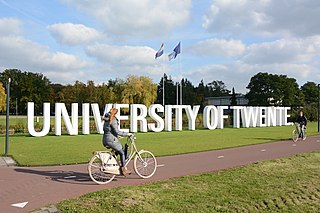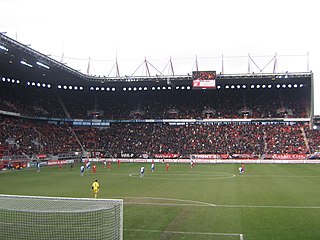Related Research Articles

Enschede is a municipality and city in the eastern Netherlands in the province of Overijssel and in the Twente region. The eastern parts of the urban area reaches the border of the German city of Gronau.

The University of Twente is a public technical university located in Enschede, Netherlands. The university has been placed in the top 170 universities in the world by multiple central ranking tables. In addition, the UT was ranked the best technical university in The Netherlands by Keuzegids Universiteiten, the most significant national university ranking. The UT collaborates with Delft University of Technology, Eindhoven University of Technology and the Wageningen University and Research Centre under the umbrella of 4TU and is also a partner in the European Consortium of Innovative Universities (ECIU). Having produced several successful startups and spin-offs such as Booking.com, Just Eat Takeaway.com, and Xsens, the UT has received the title of Most Entrepreneurial University four times in a row from 2013 to 2019.

De Grolsch Veste is the stadium of football club FC Twente. It is located in Enschede, Netherlands, at the Business & Science Park, near the University of Twente. The stadium has an all-seated capacity of 30,205 with a standard pitch heating system and has a promenade instead of fences around the stands. It hosted the final of the UEFA Women's Euro 2017.

Pulickel Madhavapanicker Ajayan, known as P. M. Ajayan, is the Benjamin M. and Mary Greenwood Anderson Professor in Engineering at Rice University. He is the founding chair of Rice University's Materials Science and NanoEngineering department and also holds joint appointments with the Department of Chemistry and Department of Chemical and Biomolecular Engineering. Prior to joining Rice, he was the Henry Burlage Professor of Material Sciences and Engineering and the director of the NYSTAR interconnect focus center at Rensselaer Polytechnic Institute until 2007. Known for his pioneering work of designing and carrying out the first experiments to make nanotubes intentionally.

John Robert Kirtley is an American condensed matter physicist and a consulting professor at the Center for Probing the Nanoscale in the department of applied physics at Stanford University. He shared the 1998 Oliver E. Buckley Prize of the American Physical Society, and is a Fellow of both the American Physical Society and the American Association for the Advancement of Sciences.

Twente Airport is located 2 NM outside of Enschede in Overijssel, Netherlands. It has one runway (05/23), though two of the current taxiways and platforms have been used as runways. The airport is currently uncontrolled and closed for scheduled passenger flights and military operations. A local flying club uses the airport for their activities. The airfield has also been approved for limited use by business charter operators and aircraft scrapping, storage and maintenance.


Gronau (German pronunciation: [ˈɡʁoːnaʊ]; officially Gronau , is a town in the district of Borken in North Rhine-Westphalia, Germany. It is located near the border with the Netherlands, approx. 10 km east of Enschede. Documentary evidence of Gronau dates to 1365.
NanoNed is the Nanotechnology Research and Development initiative of Dutch Government. It is financed Ministry of Economic Affairs (Netherlands).Dutch Technology Foundation STW is responsible for the program management of NanoNed. It is a consortium of seven universities, TNO and Philips. University of Leiden, University of Utrecht and FOM institute AMOLF in Amsterdam are also the partners of NanoNed. Around 400 researchers are working within all these partners. On the basis of National Research and Development strength and industrial needs, 11 interdependent program has developed and named as "Flagship". Each of these flagships is led by a "Flagship Captain". In 2009, more than 400 researchers are working in different 200 projects.

Gerhard Klimeck is a German-American scientist and author in the field of nanotechnology. He is a professor of Electrical and Computer Engineering at Purdue University School of Electrical and Computer Engineering.

Martin Bodo Plenio is a German physicist, Alexander von Humboldt Professor, and Director of the Institute for Theoretical Physics at Ulm University.

Albert van den Berg is a Dutch physicist who works on nanotechnology-miniaturization in physics, chemistry, biology and biotechnology.

Saxion University of Applied Sciences is a Dutch university of applied sciences with three campuses in the eastern Netherlands. It provides more than 100 courses in study fields as archaeology, finance, law, engineering, hospitality, business, IT, broadcasting, health and digital media. With over 27,000 students, it is one of the largest institutions of higher education in the Netherlands. Saxion offers bachelor & master education and research focused on living technology.
David M. Berube is a professor of communication at North Carolina State University in Raleigh, North Carolina. His doctorate is from New York University and he has studied and taught communication and cognitive psychology and created the term SEIN in his book NanoHype.
Ashok M. Raichur is an Indian materials scientist, nanotechnologist and a professor at the Department of Materials Engineering of the Indian Institute of Science, Bangalore. Known for his studies on the use of nanotechnology for biomedical and environmental applications, Raichur is a former Alexander von Humboldt Fellow and a life member of the National Academy of Sciences, India. The Department of Biotechnology of the Government of India awarded him the National Bioscience Award for Career Development, one of the highest Indian science awards, for his contributions to biosciences, in 2009.

Aimee van Wynsberghe is an AI ethicist at the University of Bonn in Bonn, Germany. She is also the president and co-founder of the Foundation for Responsible Robotics, a not-for-profit NGO that advocates for the ethical design and production of robots.
Hai-Quan Mao is a Chinese chemist and nanotechnologist. He is a professor at Johns Hopkins University and associate director of the university's Institute for NanoBioTechnology. He is a fellow of the Royal Society of Chemistry and the American Institute for Medical and Biological Engineering and a member of the National Academy of Inventors.

Anatolie S. Sidorenko is a doctor of physical and mathematical sciences and professor at the Technical University of Moldova. He specializes in condensed matter physics with the focus on electronic transport and magnetic properties of low dimensional systems – thin films and layered superconductors, design of superconducting devices and sensors. He made key contributions to investigation of novel superconducting materials and hybrid structures superconductor-ferromagnet, multiband and triplet superconductivity.
References
- ↑ "Larry Robertson, head of UIO Dept. of Occupational and Environmental Health". The University of Iowa, College of Public Health. Retrieved 21 September 2018.
- ↑ "Freek Ariese at VU.nl, research listings". VU Research Portal. Vrije Universiteit Amsterdam. Retrieved 21 September 2018.
- 1 2 3 Stefan Werding (20 September 2016). "Professor Gregor Luthe: Lieber Gronau als Berkeley / Gronau over Berkeley". Westfälische Nachrichten (in German). Aschendorf Medien. Retrieved 2018-03-21.
- ↑ Gregor Luthe (28 October 2014). "Alles war kopflos (Everything was headless)" (in German and Dutch). ScienceGuide. Retrieved 23 August 2015.
- ↑ "Former Diploma and Master Students :: Current Group-Alumni". Uni Münster, Research Group of Prof. Dr. Jan Andersson. Retrieved 23 August 2015.
- 1 2 "Introduction of Gregor Luthe (presentation)" (PDF). Saxion University of Applied Sciences. Archived from the original (PDF) on 31 October 2016.
- 1 2 "Humboldt Network, Query Details: Gregor Luthe". Alexander von Humboldt Foundation. Retrieved 17 August 2015.
- 1 2 "Biography Gregor Luthe". Saxion University of Applied Sciences. Archived from the original on 3 August 2014. Retrieved 15 November 2016.
- ↑ "Portret: Gregor Luthe en Paul Borm – Twee ondernemende nanotechnologen over het beter benutten van kennis en kunde / Portrait: Gregor Luthe and Paul Borm – Two Enterprising Nanotechnologists on the Better Use of Knowledge and Science". Thematische Impuls, HTSM (in Dutch). Netherlands Organisation for Scientific Research (NWO) division Nationaal Regieorgaan Praktijkgericht Onderzoek SIA (Taskforce for Applied Research). SIA, Stichting Innovatie Alliantie. February 2013. pp. 30–35. Archived from the original (pdf) on 22 March 2018. Retrieved 21 March 2018.
- ↑ "Gregor Luthe". Interdisciplinary Graduate Program in Human Toxicology. The University of Iowa. Retrieved 10 August 2015.
- ↑ "First Nano Chair of the Netherlands" (in Dutch). ScienceGuide. 10 February 2012. Retrieved 10 October 2015.
- ↑ Martin Brock (15 January 2014). "Conference in Enschede: Starting to the Nano Era". Westfälische Nachrichten (in German). Aschendorff Medien. Retrieved 20 October 2016.
- ↑ "Saxion and University of Twente join forces in nano research". University of Twente. 19 September 2014. Archived from the original on 31 October 2016. Retrieved 20 October 2016.
- ↑ "Vertrek lector Gregor Luthe" (in Dutch). Saxion University of Applied Sciences. Archived from the original on 31 October 2016. Retrieved 18 October 2016.
- ↑ "DGCh > Structures > Young Chemists Forum > Foreign Countries Tutor in the Netherlands" (in German). Gesellschaft Deutscher Chemiker (DGCh) / German Chemical Society.
- ↑ "Gregor Luthe: Most inspiring lecturer of the Netherlands" (in Dutch). Saxion University of Applied Sciences. 5 March 2013. Archived from the original on 25 August 2017. Retrieved 15 November 2016.